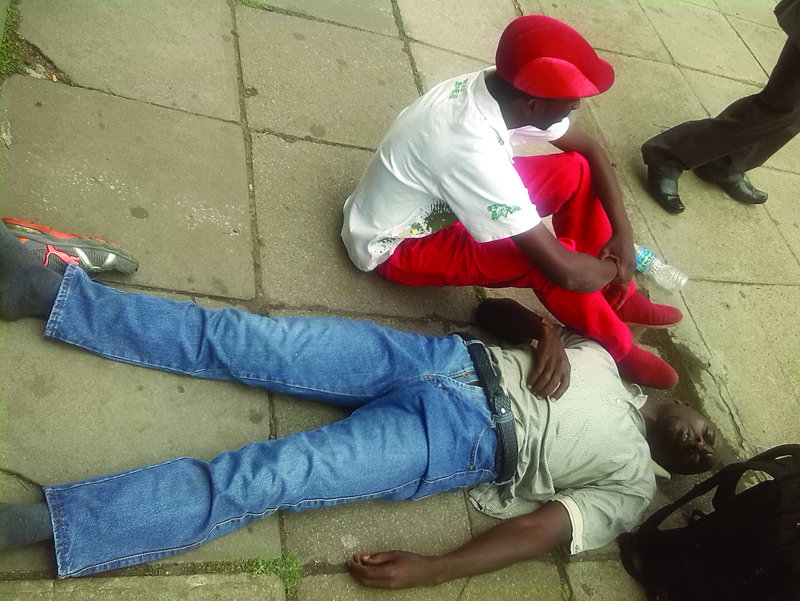
“Your Excellency, we make the point that failure to act now will result in the unpalatable suffering of the Zimbabwean people and the temptation by others to resort to unlawful and unconstitutional means of redress.”
Sunday View by Farai Gwenhure
The above statement is a direct extract from Tendai Biti’s dossier addressed to the Sadc heads of state delivered to them at the Sadc summit held in Victoria Falls in 2014. To an ordinary reader, the general gist of the statement of this nation degenerating into chaos was far-fetched than realistic. However, recent developments may point out to the fact that this was an apt assessment of the Zimbabwean situation.
Indeed the Zimbabwean people, as what has since became the norm, have suffered and continue to wallow in joblessness, hunger, abject poverty garnished by an unrelenting spirit of hopeless sadness.
In the middle of all this sad plight, Zimbabweans are known for suffering quietly, adjusting and moving on with their lives, seemingly oblivious of the political and economic crisis arresting them. Recent developments however indicate a high level of civil unrest in the nation, which any person concerned with the peace and harmony in the country should interrogate further and maybe after the introspection try to chat an urgent way forward.
Unco-ordinated eruptions of unrest are more dangerous than organised revolutions in which the objectives of demonstrations are in the minds of a specific group leading protestors and controlling the rest of the group, including restraining them from going beyond the agreed plan.
The ones which manifested at “a mild scale” recently in Zimbabwe are a clear indicator of a nation comprising citizens frustrated by varying kinds of concerns.
The most covered of them all was the prison riot at the country’s biggest state penitentiary — Chikurubi Maximum Security Prison. At least five people lost their dear lives during the incident. Information in the public domain is to the effect that the food riot, resulted from the state’s failure to provide food for the people being held at the institution.
- Chamisa under fire over US$120K donation
- Mavhunga puts DeMbare into Chibuku quarterfinals
- Pension funds bet on Cabora Bassa oilfields
- Councils defy govt fire tender directive
Keep Reading
At face value, the temptation to ignore the matter or dismiss it as a case of stubborn convicts is there. This is without mentioning the fact that a prison also has innocent people remanded in custody.
Worryingly, food shortage is not only confined to prisons. a few weeks ago the forgotten “Ahoi” slogan echoed across the leafy suburb of Mt Pleasant when angry students were denied lectures by the University of Zimbabwe despite the fact that all of them had paid tuition fees in full. The two cases are just a tip of the iceberg as more signs of civil unrest have manifested in the past few days. At the University of Zimbabwe, while students were singing war songs, lecturers across the country were threatening similar action owing to the fact that they had not been paid their dues. The same was also happening down south at the National University of Science and Technology where students and lecturers were threatening to go toi toying in demand of what is due to them — quality education to the student and salaries to the lectures. It is an injustice, not to mention that the state universities must not have an excuse at all because they employ a capitalist model when dealing with the students; it’s either you are paid up or you are an undesirable element on campus. The point is, when someone has paid, surely the service provider should deliver without fail, especially when they insist on payment upfront. Workers in various institutions have recently been at loggerheads with their employers; Grain Marketing Board (GMB) workers were camped demanding their dues for more than two days. At Mbada diamonds offices in Manicaland, the same happened for almost a similar period. Women had to bring food to their husbands who continued with the peaceful protest, including a vigil. On the human rights front, scores of MDC-T members took to the streets demanding the release of Itai Dzamara who was abducted and is still being held incommunicado. To worsen the situation, the police went on to beat up workers at Harvest House, a situation which could have easily exacerbated the tension. One thing is clear in all the cases mentioned above — mismanagement and poor governance are basic causes of the protests. This is a serious cause of concern bearing in mind that the institutions referred to in the cases are just a reflection of the wider governance context in which the state is the biggest culprit. Surely, the opening statement of this note is not a far-fetched hallucination.
Farai Gwenhure is a journalist by training and writes in his personal capacity.











